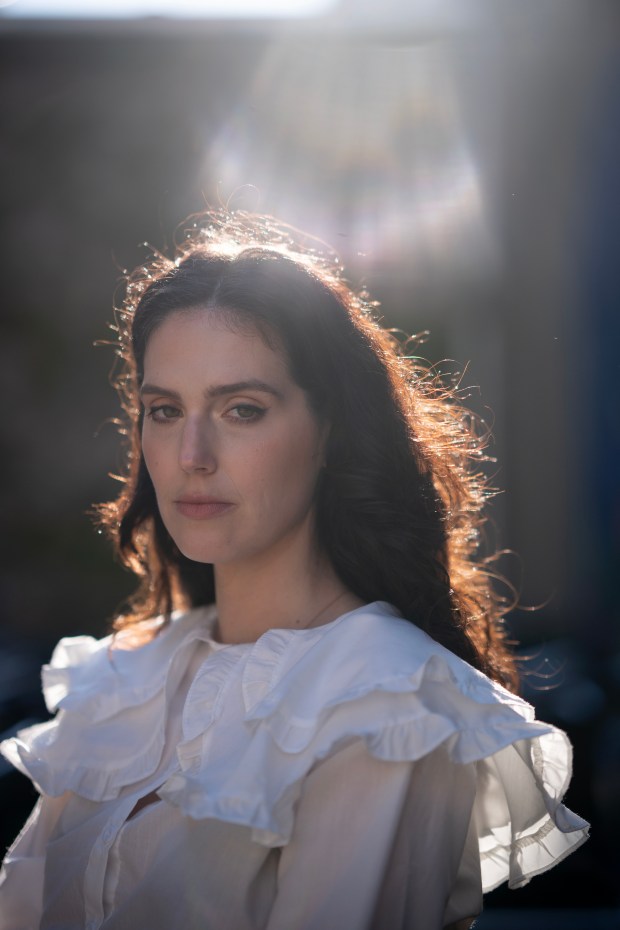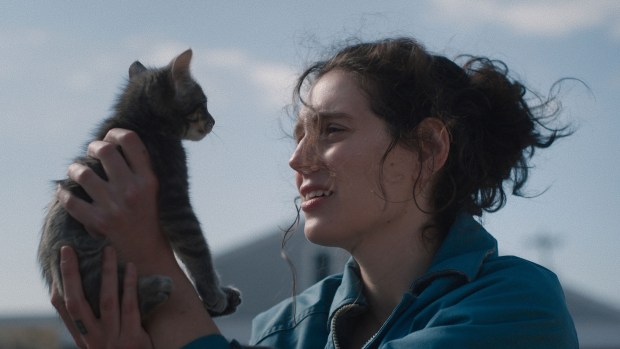Four months ago at the Sundance Film Festival, a terrific debut film called “Sorry, Baby” made its world premiere and won the screenwriting award and led, quickly — surprisingly so, in this post-pandemic realm of diminished moviegoing and movie-buying expectations — to very good things.
It led to a rumored $8 million distribution deal with A24, with a release planned for late June and early July. More broadly, “Sorry, Baby” sparked the feeling among festival audiences, most recently at the Chicago Critics Film Festival in early May, that screenwriter-actor-director Eva Victor had truly taken care of business with their directorial feature debut.
Victor’s film is many things, plus one overriding and quite rare thing: a calm, confident and dead-serious dark comedy, risking a lot right there, about a young woman’s coping mechanisms in the emotionally muddy aftermath of sexual assault. Victor, who made some of the funniest pandemic micro-films in existence and is best known for their role as Rian in the long-running “Billions,” plays budding academic Agnes. We meet Agnes several years after what happened with her professor, inside the professor’s house.
None of “Sorry, Baby” works the way many will expect. It’s a movie about “how time moves in the aftermath of this kind of trauma, and the way memory works,” Victor told me. It’s also a story of female friendship, the drama and wormy comedy inherent in academia and petty academic jealousies — and the difficulty of moving on with the work-in-progress and tangled psychic wiring that is every human life.
Now 31, Victor was born in Paris, raised in San Francisco and attended Northwestern University, where they were drawn, like a moth to the flame of probable career disaster, to comic improvisation as well as acting training. Victor then moved to New York, with life experiences both harsh and emboldening along for the ride.
Our conversation is edited for clarity and length.
Q: You wrote the script for “Sorry, Baby” early in the pandemic. This was after you’d dealt with the inciting incident from your own life in some of your other work, your other writing. How did you arrive at the right form for what is clearly a personal work of fiction?
A: I went up to Maine for a couple of months in early 2021. My cousin’s cottage. Mid-coast, Camden. Have you been? Very beautiful. Almost unbelievable. So idyllic. In the summer, you take a dip in cold water, it’s warm outside, the sun is shining, the flowers are blooming. In the winter, when I was there, it’s just this grey and blue. The winter was good for writing. It matched my mood. Sometimes it’s sad to be somewhere sunny, you know. If you’re working.
I don’t have an issue with discipline, but I wanted to write it in a monk-like way, I guess. And I had this opportunity that got me out of my Brooklyn apartment, and be in a space where it felt like I could be alone but not completely isolated. It’s a gift, that kind of privacy.
Q: How you managed to find so much humor, gallows or otherwise, in “Sorry, Baby” is something I want a second viewing to figure out for myself. Before you wrote it, you’d already been encouraged by filmmaker Barry Jenkins (“Moonlight” “If Beale Street Could Talk”) and his production company, Pastel, is that right?
A: Barry had seen my videos online and told me if I had a script I wanted them to read, they’d read it. Then we did a general meeting and he was very supportive. He said, “You haven’t directed a feature, but you’re directing your videos. Directing is making choices. You’re already doing that.” So I went off and wrote this and sent it to them, and said: What do you think? Does it make sense?” That led to two years of conversations and then we made it a year later, in February 2024.
Q: In the movie, what you show us of what happens with Agnes and her professor is really striking, and so unusual for movies in general. The camera stays outside the house for a long time. No music, no “indicating,” though we fear what’s going on. And then Agnes kind of stumble-rushes past the front door on the way out. None of it’s spelled out in the usual melodramatic or movie-stupid way.
A: Thanks. That decision to let the moment take its time, to build tension that way, is really why I wrote the film. I was searching for a film that didn’t really exist, to my knowledge, one that didn’t show the violence but spoke to the experience, and the loneliness of that experience. That was why I wrote it.
It’s a very personal story, and emotionally it needed to feel truthful. The beautiful thing about making a film is you get to make something that’s true to your emotions, but you’re inventing and transporting and taking that story somewhere else. Obviously, the film lives in a tender place for me. My (autobiographical) truths are hidden in it throughout. I’m in there in ways that aren’t completely discernible but hopefully it feels true.

Q: It hardly needs saying, unfortunately, but it’s just a maddening percentage of people in the world who’ve found themselves somewhere in, or near, the circumstances Agnes finds herself.
A: Yeah. It’s weird to be showing this film to more and more people at festivals, and feel the presence of this sad community (laughs). Let me put that another way: to feel a connection to people because they’ve had this sort of experience, which is devastating. You write a film, at least I did, because you’re kind of screaming inside: Hey! I’m alone! Is anyone else out here? And then you find out there are people out here with you. It’s sad to realize. But it’s also a relief. And a privilege to connect.
Michael Phillips is a Tribune critic.



